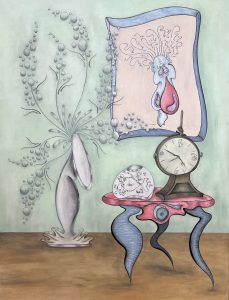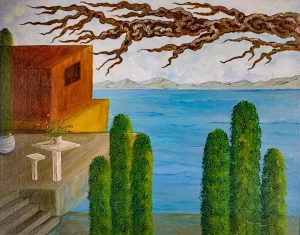My mother, Marjorie, is just about the most talented interior designer in this city. I discovered this when we got a big-screen television. We had never been able to afford things like that before. Since then, her success never fails to impress me. My mother earns in a quarter what I earn in a year–and I’m a commercial real estate agent. I don’t know if she simply has a talent for style or she can sense what theme a client wants in his or her bathroom. Maybe my mother understands how they want to feel when they are showering–or how they want to feel while preparing dinner. I’m not sure. Her creativity has puzzled me for thirty years. She has a way with color that stuns, pleases, shocks… when I walk into our sitting room, it’s as if I am hiking in the forest–almost smelling leaves and stone. She is sure talented.
Oh, yes. And she’s blind.
She’s been blind since birth. I think it gives her an unfair advantage in several fields. Take music: She always hears the flutes before I do. Once, I brought home a Stravinsky CD and listened to it ten times until I could pinpoint exactly where the first flute began. She listened and spotted a flute in the introductory section. I had to listen to the piece five more times before I could distinguish the whispering flutes at the moment she did. Amazing to be blind.
My father had been blind since he was eighteen and suffered head trauma in a motorcycling accident. He still rides the Harley around the yard. The funniest thing to watch, especially since he still won’t wear a helmet. He says it keeps him from hearing the hum of the bike. Mom put a fence around her flower garden to protect “her babies from her madman.” He doesn’t smash into the fence anymore. I never told mom how many times he had.
After watching my father skid down the dirt driveway, I opened my parent’s front door as my mother said, “Tell them I’ve decorated every doctor’s home from here to North Province!”
“I did, Marjorie. They won’t go for it.” Belinda, my mother’s assistant, looked at me and shrugged her shoulders. I sat down on the paisley chair near the window. Belinda reclined on the settee and watched my mother fiddling with upholstery samples at the table.
Belinda is five years my junior and has worked for my mom for almost eight years. My mom takes Belinda everywhere: Belinda tells her the layout of the rooms and describes the windows, doors, and woodwork. She tells my mom what styles the other rooms are and mom takes it from there. Often, when shopping for material and paint, Belinda will explain the colors and patterns. She is trustworthy, obviously. Belinda told me once, “Your mom’s amazing. She gets a sense of the patterns and colors and then hands me the swatch arrangement. It’s not possible, but she just knows what looks beautiful. I have worked for four decorators and your mom has more sense of style and color than any of them.”
My mother said, “I want that account, Belinda.”
“I realize that, Marjorie,” Belinda said.
“Show them the portfolio again. Especially the Friedman residence. I think this couple has the same taste. None. Show them the chiropractor’s office we completed last March.”
Belinda closed her dark brown eyes. She said, “I did, Marjorie. The wife is beyond stubborn.”
My mom sighed and lowered herself into a dining room chair. She said with no sense of irony, “I hate blind people.”
“Well, you will eventually have to admit it–it is a little unbelievable,” I said.
Mom’s face brightened, and a smile played on her lips. She asked, “Are you curious about how I learned how to do what I do?“ She waited for Belinda or me to react. We didn’t make a sound. She said, “Your father taught me.”
I leaned forward. Belinda motioned for me to sit next to her, and I moved onto the settee. Belinda smiled at me.
“It was amusing, actually. Back when we were both at Richardson’s School for the Blind. Your father was so young. Thinner. A little wisp of a man. His voice was very good-looking–muscular. I pretended to ignore him for almost a month. Which was an agreement at the school: The blind since birth people never hung around the blind mid-life nerds. Big babies, most of them.” She smiled. I see her dimple in her cheek and I realize she has never admired her own beautiful reflection.
“Then one evening, I’m sitting in the dining room eating my pumpkin pie and your father comes up to me. And I realize who it is because he wore this god-awful cologne. And he says, ‘Do you like pumpkin pie?’ I laughed and said, ‘Yes, I’m eating it, aren’t I?’
“‘Well, the fork is scraping against the plate and I can smell pumpkin. There’s no one else at the table. So, I guess you are,’ he says, taking liberties by joining me at the table.
“’You’re a genius,’ I told him. I was heavy into hyperbole and sarcasm in my younger days.
“He says, ‘I’m getting better. Still can’t get to the bathroom without tripping over that step in the hall. Bob and I are going to count it tonight. Again.’
“’The problem is,’ I say, proud of being an honor student in pacing, ‘that there’s a half-step–if you forget to count that, down you go.’
“He says, ‘Guess there isn’t much I could teach you…’ He sounded discouraged, which is really what I wanted. That cologne was awful, and he was breaking the unspoken rule. I was fearful the other birth-blind kids would perceive him in my presence. But his voice told me he had a nice ass. Guys with nice asses always have a certain demeanor in their voices. Ah, to be seventeen…
“Anyway, I told him, ‘Probably not much you can teach me.’
“There was silence, but he hadn’t gone away. I kept eating. Then he said it. ‘Tastes like orange, doesn’t it? Not a light orange, but a rust orange. A deep rust.’ Then he left the table.
“I was so intrigued. I waited a few minutes to follow him. Back then, young ladies did not just follow young men. We waited. At least, that was the proper behavior. I was never fond of societal rules. I easily found your father on the front lawn by following the stink of that cologne. He was laying there, in the dark, alone. Humming some little tune.
“I sat next to him and asked, ‘What did you mean, tastes like rust?’ I could tell he was smiling–the humming stopped.
“He picked a piece of grass. He offered it to me and said, ‘Taste this.’
“I took it from his rough hands, knowing what it was, and popped it, awkwardly, in my mouth. ‘Grass. Wow, you really know how to treat a lady,’ I said as I chewed.
“’That, my dear, is green,’ he said. His voice made me shiver.
“’I know grass is green,’ I said, feeling blind.
“’Yes, but that is what green looks like. Not a deep green. Deep green is the smell of pine — like a Christmas tree. Lime tastes light green–almost yellow. Especially lime ices. Grass tastes your run-of-the–mill green.’
“I chewed several more times, letting the metallic flavor coat my tongue and gums. What was he talking about? I have never seen color. They taught me what colors things were, but that really didn’t matter. What does color mean to a blind girl? ‘Green,’ I said.
“He sat up, excited and babbling like he does. ‘Colors have feelings with them. Colors always reminded me of tastes and smells. When people say, Are you feeling blue? That’s because blue is depressed and cold sometimes. Not the blue of the sky–that’s refreshing. Sad blue is blue like the ocean in the winter–cold and lonely.’
“He taught me to experience colors.”
Belinda’s eyes widened and sparkled in the sunlight. With her delicate hand, she brushed back her chestnut bangs and asked, “What’s yellow?”
“Light yellow is lemons. Warm and sharp. Dark yellow is the sun and the heat. Oranges are orange. Light green is limes. Your father was wrong about a few colors. Deep green is not Christmas trees–that’s pine green. Deep green is asparagus. We still disagree about that.”
“What’s red?” Belinda asked as she picked up a sample of red velvet selected to cover Missus Thurston’s chairs.
“Red. Deep red is blood. Normal, average red is cherries. Sometimes apples. Anger is red. That’s a flaming kind. Brown is leather or wood. My favorite color brown is oak. Delicate light brown. Tan is a sunburn, although sometimes that’s a little red too! Caramel is a soft suede. Violet is my favorite color. That’s my amethyst ring. Or the scent of ripe plumbs. Not the flavor. The scent. Dark brown is chocolate. Must be Henry’s favorite color.”
Belinda looked at me, and I frowned and shook my head.
“It’s true, Henry.” Mom insisted. God-knows-how she heard my head shake.
“Okay… what’s white?” I asked.
“Snow.”
“Cream?” I asked.
“Vanilla ice cream. Or half and half. Loss and death are black. But drums can be black. They can be silver, too. Bells are always silver. Gongs are gold. Satin is gold. Silence can be white. Rain is grey, if it’s winter. Rain in the spring is crystal blue because of the way it scents the air.” She paused and considered, “Never try sea green.”
“Why?” I asked.
“Your father,” she said as she motioned to me, “tricked me into tasting sea green. Gave me a piece of moldy bread. Nasty man.”
I laughed. “What’s a rose?”
“Wine. Contrary to popular belief, a rose is not a rose. A rose is wine. A rose is a flush.”
“What’s pink?” Belinda looked at her own blouse, wondering.
“Ah, pink.” Mom folded her hands. “Although my son is in the room, pink is the first time I kissed his father. Wonderful color.” She laughed.
“I can’t believe this.” I fidgeted. “This is the secret of your success? How can you possibly keep track of it all?”
“Well, if Belinda tells me the pattern is paisley with gold and dark green, brown and reds, I sense satin and blood and suede and asparagus. Good, powerful colors. Paisley like that is for a den, or a sitting room, or a lawyer’s office. Doctors like blues with clean coolness. I would choose a pinstripe print–with blue and grey. Or white with nothing. Perhaps blue velvet.”
“That’s convenient for some things, but what about rainbows? You’ll never be able to see a rainbow and all its majesty and glory.” I permitted a triumphant laugh. Sometimes blind people piss me off. I had her now.
Belinda glared at me and said, “Henry!”
Mom was silent. She stood and walked assuredly towards me. I returned to six-years old as she placed her hands on my cheeks and dusted the crinkles at the corner of my eyes with her fingertips. “A rainbow, my son, is something you do not understand. A rainbow is making love to someone who can make you see. Someone you believe in. Someone who believes in you. A rainbow is the child that comes from that love. All that child’s boo-boos and spelling bee awards. That child’s first word and first Valentine’s. A rainbow is waking up after a night of his fevers and finding his head cool. A rainbow is hearing him get his college diploma and his first car. That’s a rainbow. Now, go tell your father to stop riding that wretched motorcycle–he’s bumped into the fence again. The rabbits are getting into the hole he made in the picket. And let me get back to work.” She kissed my forehead. With a wave of her hand, she ordered Belinda and me to go to a restaurant and get some dinner.
I did not resist. My rainbow was waiting.



